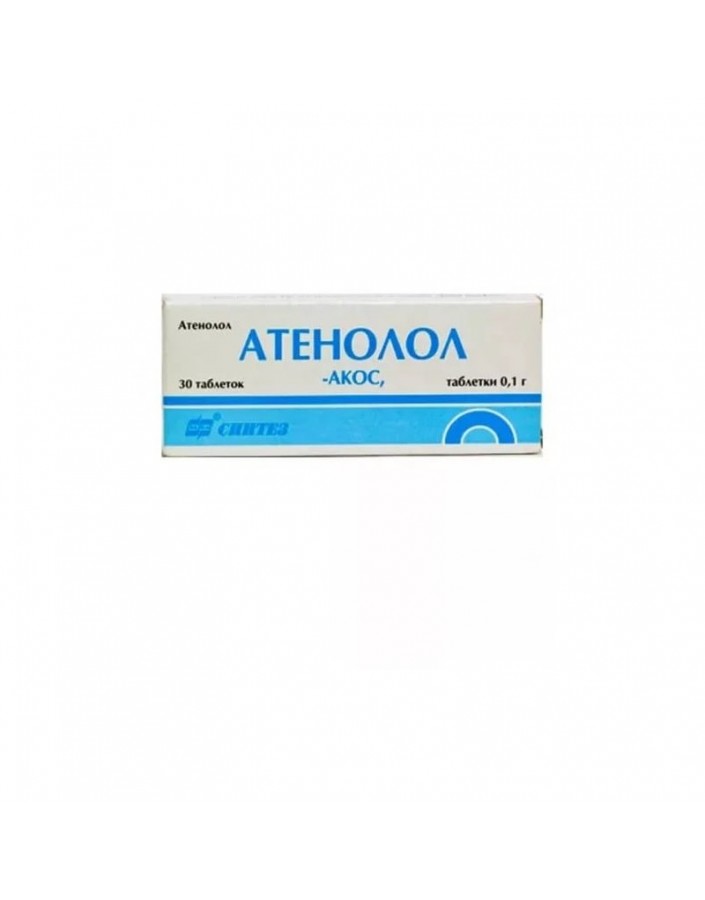




Security policy (edit with Customer reassurance module)

Delivery policy (edit with Customer reassurance module)

Return policy (edit with Customer reassurance module)
Cardio selective beta1-adrenergic blocker without internal sympathomimetic activity. Reduces the stimulating effect on the heart of sympathetic innervation and catecholamines circulating in the blood. It has antianginal, hypotensive and antiarrhythmic effects. Reduces the automatism of the sinus node, reduces heart rate, slows AV conduction, reduces contractility and myocardial excitability, reduces myocardial oxygen demand. Does not possess membrane stabilizing activity. When used in moderate therapeutic doses, it has a less pronounced effect on the smooth muscles of the bronchi and peripheral arteries than non-selective beta-blockers.
After ingestion, absorption from the gastrointestinal tract is 40-50%. Practically not metabolized in the body. Bad penetrates through the BBB. The half-life is about 6 hours. It is mainly excreted by the kidneys in unchanged form.
Arterial hypertension, prevention of strokes, sinus tachycardia, prevention of supraventricular tachyarrhythmias. Hyperkinetic cardiac syndrome of functional genesis.
Install individually. The usual dose for adults is inside, at the beginning of treatment it is 25-50 mg 1 time per day.If necessary, gradually increase the dose. In case of impaired renal function in patients with CC 15-35 ml / min - 50 mg / day; with CC less than 15 ml / min - 50 mg every other day.
Maximum dose: adults with oral administration - 200 mg / day in 1 or 2 doses.
Cardiovascular: in some cases - bradycardia, arterial hypotension, AV conduction disorders, the appearance of symptoms of heart failure.
Gastrointestinal: at the beginning of therapy, nausea, constipation, diarrhea, dry mouth are possible.
From the side of the central nervous system: at the beginning of treatment, fatigue, dizziness, depression, mild headache, sleep disturbances, feeling of cold and paresthesia in the extremities, reduced patient reactivity are possible; decreased secretion of tear fluid, conjunctivitis.
On the part of the endocrine system: decrease in potency, hypoglycemic states in patients with diabetes mellitus.
Respiratory: in predisposed patients, symptoms of bronchial obstruction may appear.
Allergic reactions: pruritus
Other: increased sweating, redness of the skin.
AV block II, III degree, sinoatrial block, bradycardia, SSSU, arterial hypotension, cardiogenic shock, chronic heart failure II B-III stage, acute heart failure, metabolic acidosis, hypersensitivity to atenolol.
Atenolol penetrates the placenta, therefore, use during pregnancy is possible only if the intended benefit to the mother outweighs the possible risk to the fetus.
Atenolol is excreted in breast milk, so if necessary, use during lactation is recommended to stop breastfeeding; if this is not possible, then ensure thorough medical monitoring of the infant's condition.
Caution should be used for obstructive respiratory diseases, diabetes mellitus (especially when it is labile), Raynaud’s disease, obliterating diseases of the peripheral arteries, pheochromocytoma (in this case, prior treatment with alpha-adrenergic blockers), thyrotoxicosis kidney, in elderly patients.
Not recommended for use in children.
With the use of atenolol, it is possible to reduce the production of tear fluid, which is important for patients using contact lenses.
Cancellation of atenolol after a long course of treatment should be carried out gradually under the supervision of a physician.
When discontinuing the combined use of atenolol and clonidine, treatment with clonidine is continued for several days after the abolition of atenolol, otherwise severe arterial hypertension may occur.
If it is necessary to perform inhalation anesthesia in patients receiving atenolol, a few days before performing anesthesia, it is necessary to stop taking atenolol or find a remedy for anesthesia with minimal negative inotropic effect.
Influence on ability to drive motor transport and control mechanisms
In patients whose activities require increased concentration of attention, the question of outpatient use of atenolol should be resolved only after evaluating the individual response.
Atenolol in the form of pills is included in the List of Vital and Essential Drugs.
With simultaneous use of atenolol with diuretics, nitrates, other antihypertensive drugs, the hypotensive effect is enhanced; with derivatives of ergotamine, xanthine, with NSAIDs - the effectiveness of atenolol decreases; with reserpine, methyldopa, clonidine, guanfacin, Verapamil, diltiazem - severe bradycardia and / or hypotension are possible; with cardiac glycosides - may increase the inhibitory effect on AV conductivity.
With simultaneous use with atenolol, the effect of insulin, oral hypoglycemic drugs is enhanced.
The use of drugs for inhalation anesthesia on the background of the action of atenolol increases the risk of inhibition of myocardial function and development of arterial hypotension, therefore, a few days before anesthesia, you must stop taking atenolol or find a remedy for anesthesia with minimal negative inotropic effect.